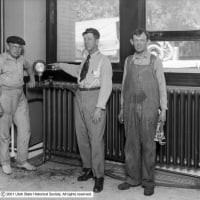Welcome! Here are the website rules, as well as some tips for using this forum.
Need to contact us? Visit https://heatinghelp.com/contact-us/.
Click here to Find a Contractor in your area.
If our community has helped you, please consider making a contribution to support this website. Thanks!
Water treatment for fire tube steamer?
Options

Timco
Member Posts: 3,040
Big acct has a 1985 or so era Kewanee steamer. They have replaced 3 tubes recently. They were told by another co that a softener would fix this but I'm not sure hardness is the issue, but we do have super hard water and last year they fixed a ton of bad traps on drips and rads to stop steam from shooting out the collection tank vent. No steam out the vent now.
Any thoughts on water treatment or ph?
Glad to see several on here! I've been swamped, and between rentals, work, and some new hobbies I've been gone too long.
Tim
Any thoughts on water treatment or ph?
Glad to see several on here! I've been swamped, and between rentals, work, and some new hobbies I've been gone too long.
Tim
Just a guy running some pipes.
0
Comments
-
water treatment
Fire tube boilers really should get some kind of special care. Boiler scale as a cause of efficiency loss is well known. Tubes thus insulated will overheat causing premature failure. Another factor is oxygen pitting and the formation of nearly sealed rust nodules that will corrode right through the metal until the tube springs a leak.
A water softener alone may not be the answer as it does nothing about oxygen corrosion. In some ways, clean metal boiler surfaces are more prone to such attack.
I suggest a water softener, but only with the concomitant use of an oxygen scavenger and a dispersant. Bear in mind that oxygen scavengers have a very short life in the boiler. Actually, their shelf life isn't great, either. They need to be added virtually with every feed, and must be purchased fresh every season.
I've just instated a water treatment program at a site where the steam heating fire tube boilers have been retubed and am using the Rhomar Water 901 concentrated water treatment (that includes an oxygen scavenger) and their 645 dispersant. A water softener has been put into service as well. Injection quills on the boiler feed lines inject small amounts of water treatment chemical every time the feed pump operates. Small chemical feed pumps operate off AC power from an auxiliary relay when the boiler feed pumps operate.
I'll see how it works out in another month and at the end of the season. In another month, we are taking one boiler at a time off line to do a thorough inspection of the condition of the new tubes and to see how the water treatment is dealing with old encrustations left by mechanical descaling. All manhole and handholes will be opened for a good rinse-out and inspection.
Actually, the chemical treatments have quite a good track record, but the fact of the matter is that someone has to be monitoring (testing) the boiler water on a very regular basis to determine blowdown schedules and required chemical dosing. We measure pH, conductivity (a measure of total dissolved solids) and sulfites (a measure of oxygen scavenger concentration).
I highly recommend it. These boilers are from 1961 and have had their tubes replaced for the first time. I came across all the old records of how the system was maintained by the original management. Doted on, I would say! The records stopped in 1987 (there are still 1987 calendars on the wall) when the building was sold. Maintenance was spotty from then until now (actually, does the term "knucklehead" ring a bell?).
That Kewanee is worth the effort of proper preservation.Terry T
steam; proportioned minitube; trapless; jet pump return; vac vent. New Yorker CGS30C
0
This discussion has been closed.
Categories
- All Categories
- 87.3K THE MAIN WALL
- 3.2K A-C, Heat Pumps & Refrigeration
- 61 Biomass
- 429 Carbon Monoxide Awareness
- 120 Chimneys & Flues
- 2.1K Domestic Hot Water
- 5.8K Gas Heating
- 115 Geothermal
- 166 Indoor-Air Quality
- 3.7K Oil Heating
- 77 Pipe Deterioration
- 1K Plumbing
- 6.5K Radiant Heating
- 395 Solar
- 15.7K Strictly Steam
- 3.4K Thermostats and Controls
- 56 Water Quality
- 51 Industry Classes
- 50 Job Opportunities
- 18 Recall Announcements
